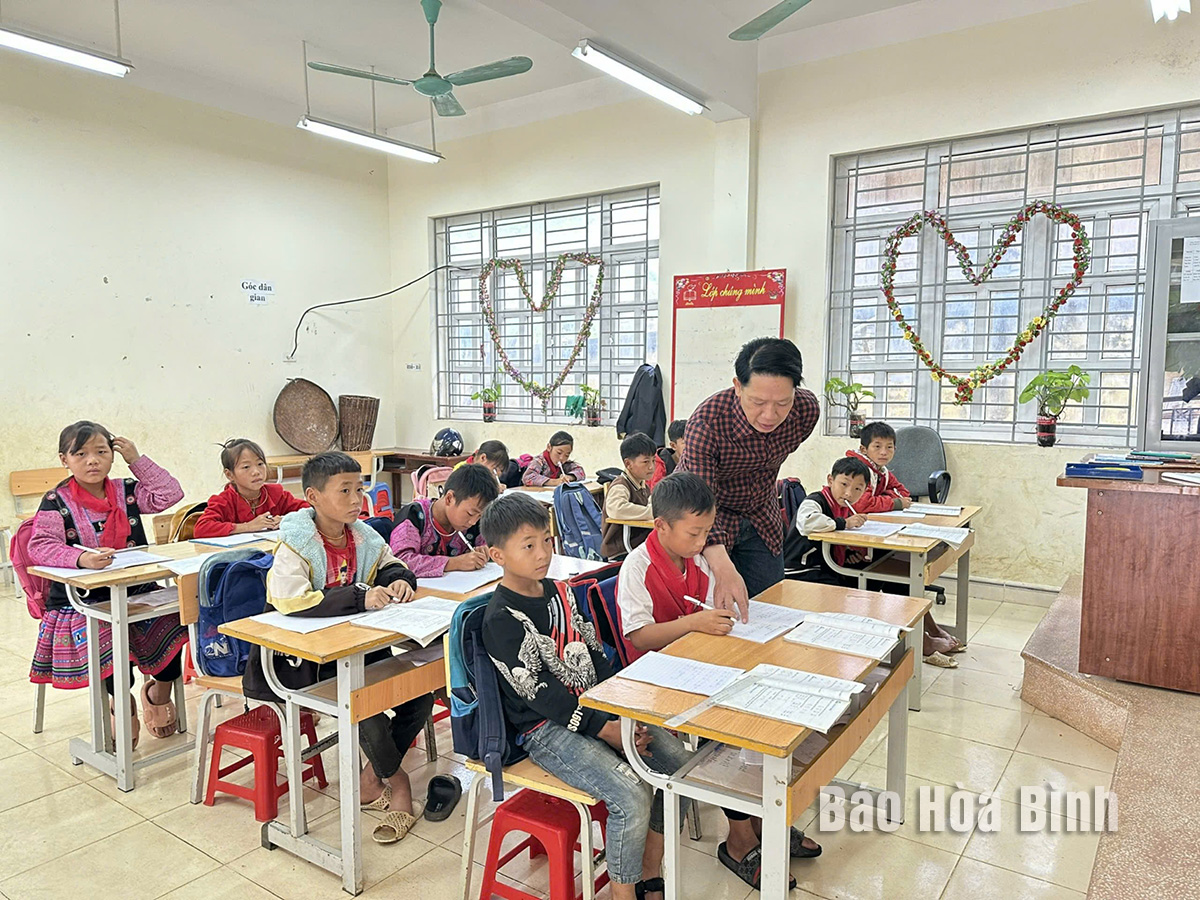
Despite a low starting point, the mountainous district of Mai Chau has effectively implemented the National Target Programme on New Rural Development, resulting in significant improvements in people’s life and rural look.
A class in Hang Kia commune in Mai
Chau distric.
The district has focused on diverse communication activities to engage
residents and launched emulation movements, for examples, "Mai Chau unites
to build new rural areas", "Clean houses, beautiful garden, fresh
air, civilised residential areas", "Keep environment clean, green and
nice”, and "All people develop new rural areas and civilised hamlets.”
Many people have voluntarily contributed land and labour to build rural
transport infrastructure and welfare projects.
Local organisations have actively responded to movements relating to new rural
area development. The Farmers' Association has promoted effective production
models, while the Women's Union has implemented programmes for environmental
sustainability and family improvement. The Youth Union has led community
infrastructure projects.
Additionally, the district has prioritised production development and living
standards through effective agricultural models and support for local products.
The district allocated capital sources to support production development,
develop One Commune-One product (OCOP) products such as green-necked duck,
Muong Pa black pig, Mai Chau rice, and Thanh Son garlic.
Kha A Vau, Chairman of Hang Kia commune People's Committee, said that local
transport infrastructure, schools, and a healthcare centre in the commune have
been gradually improved.
Moreover, local residents received support to develop production, as well as
vocational training and training in scientific and technical knowledge.
They are given plant and animal varieties, and get help in
developing community-based tourism. As a result, the lives of the people have
been gradually improved.
Since the beginning of this year, the district has mobilised 350 billion VND
for new rural development including about 31 billion VND from the central
budget, 59.2 billion VND from the provincial budget, 104 billion VND from the
district budget, 54.3 billion VND from other programmes; and 684 million VND
from local residents. Local resident donated over 1,800 sq.m of rice land and
45.92 sq.m of residential land for infrastructure works.
To date, 7 out of 15 communes in the district have met criteria of new rural
areas, with ongoing improvements in infrastructure, agricultural cooperation,
and social well-being.
Ha Trung Thao, Vice Chairman of Mai Chau district People's
Committee, stated that the most significant achievement in building new rural
areas in the district is the noticeable change in awareness among officials,
Party members, and the people.
People have willingly supported the movements to build new rural
areas. They take part in keeping environment clean and green, donating land,
and developing linkages in agricultural production. As the results, the rural
environmental landscape has been enhanced; social security has received due
attention; and security and social order have remained stable. Grassroots
democracy has been promoted, contributing to the successful implementation of
local political tasks.
In Hoa Binh province, 11 traditional craft villages with more than 400 small-scaled production households have put in place a clean and green production model, establishing new standards for sustainable development. Waste collection sites and wastewater treatment facilities have been meticulously managed by local residents.
To make it easier for the residents to handle administrative procedures, Yen Bong Commune (Lac Thuy District) has identified the administrative reform as one of its key tasks. By implementing a range of synchronized solutions, the commune has seen the positive changes in the administrative reform, meeting the needs of its people.
Mai Chau district has firmly established itself as a standout destination on Vietnam’s tourism map, attracting both domestic and international visitors with its breathtaking landscapes, rich ethnic culture, and warm hospitality. However, beyond its natural and cultural charm, a secure and well-managed tourism environment has added to Mai Chau’s appeal.
As Vietnam enters a new phase of economic and administrative reform in 2025, Hoa Binh province is stepping up its efforts to streamline governance, boost economic growth, and attract investment.
The Hoa Binh provincial People's Committee held its monthly meeting on March 26 to review the progress of key projects, assess budget revenue and public investment disbursement, provide feedback on draft documents for submission to the provincial Party Committee's Standing Board, and discuss other important matters related to the committee's governance activities.
Playing a key role in Hoa Binh province’s economic development, Luong Son district has been focusing on science and technology development, innovation, and digital transformation.



